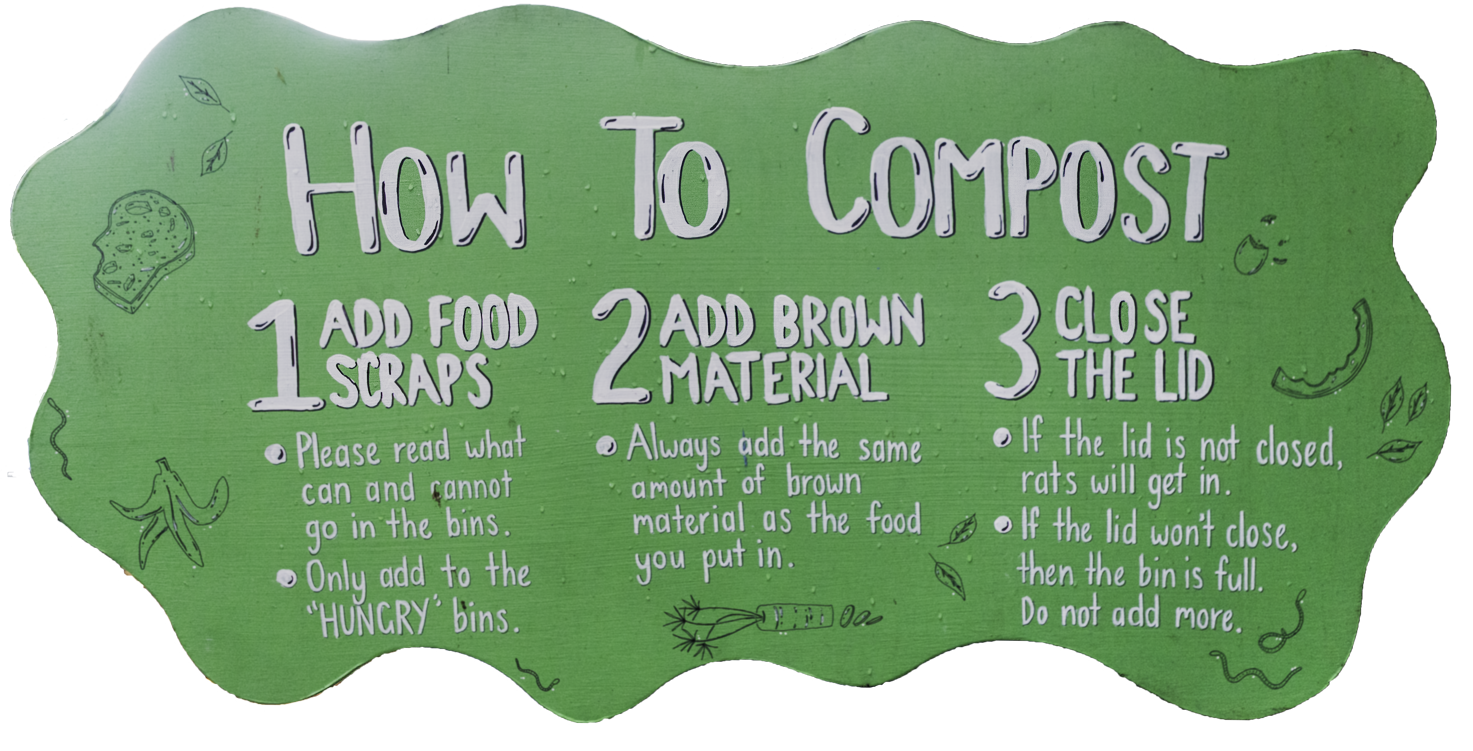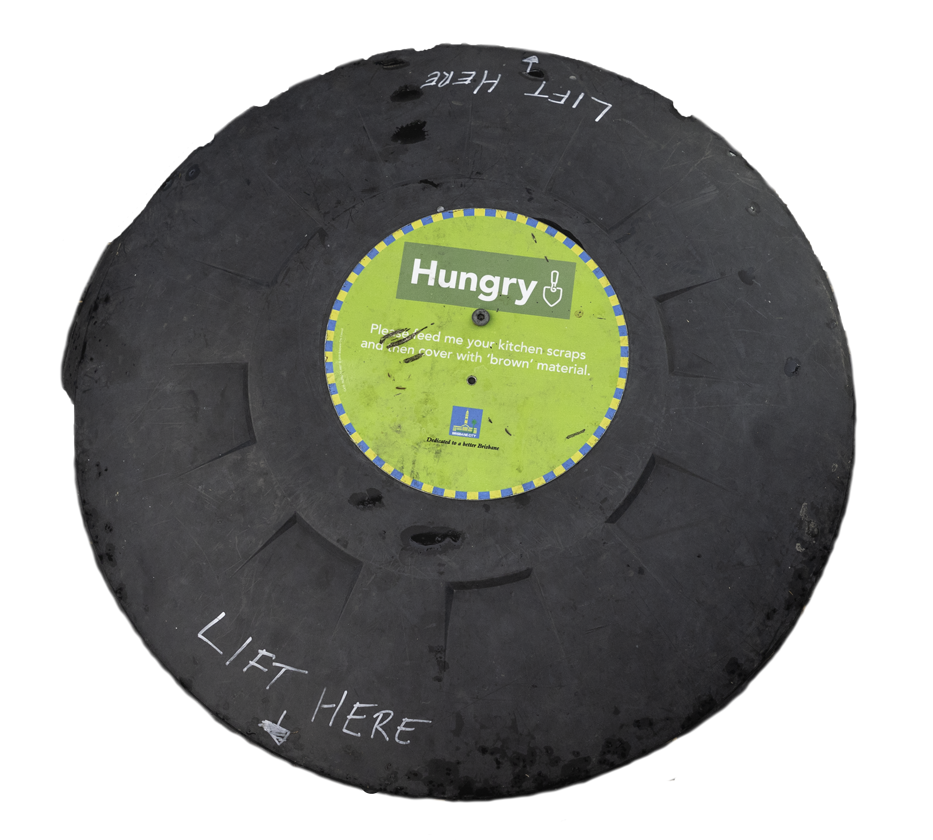Our composting hub is available for everyone to use!
It is a simple system and an amazing way for us to reduce our negative impact on the planet.
STEP 1 - ADD FOOD SCRAPS to the ‘hungry’ bin
There is a large sign at the composting hub saying what CAN and CANNOT go in our compost bays. Please read it!
If you are unsure if it can go in, then DON’T put it in.
Only ever add your scraps to the green lid that says “HUNGRY”.
step 2 - ADD BROWN MATERIAL
Always add the same amount brown material as the food you put in. We provide straw and/or leaves for you to add. Please don’t add your own shredded paper or cardboard.
STEP 3 - CLOSE THE LID
If the lid isn’t on properly, then rats and vermin can get in.
There are signs at the facility explaining everything you need to know.
DONATE TO KEEP US GOING!
Managing the composting hub is hard work!
We spend multiple hours each week aerating every compost bay and ensuring the facility is working properly. Unfortunately, we do not receive any funding to manage it and it is a pretty tall ask to expect this to be done on a volunteer basis.
Our main expense (asides from physical labour) is providing sugarcane bales for people to use as brown material. These bales cost $12 each and we can go through as many as 10 per month.
Therefore, until the day comes that we are financially supported by Council or Government, we require your help to keep us going. If you use the composting hub, we ask that you make a $25 annual donation (click here to donate) and/or join at least 2 of our working bees to help with managing the compost.
We thank you for your efforts in reducing the amount of food that enters landfill and we appreciate any contributions you are willing to make.
"Why can’t I add food scraps to a red bay?”
If new material is always added, that bay will never finish breaking
down. Each bays is left for approximately 3 months to allow
the material to fully break down.
Why should I compost?
If we put our food scraps in the red bin, everything goes to landfill. A landfill is a giant pit where waste is buried and left to break down anaerobically (without oxygen). This lack of oxygen creates a gas called methane. Methane is a greenhouse gas and approximately 30 times more potent than carbon dioxide. An increase in greenhouse gases in our atmosphere means more heat is trapped, rising temperatures and in turn changing our climate!
When we put our food scraps in the compost bin, it is broken down aerobically (with oxygen). Aerobic breakdown is faster, kills off pathogens and does not produce methane. Our compost bays are turned every week to ensure the process stays as aerobic as possible.
CLICK HERE TO READ MORE ON HOW TO REDUCE YOUR WASTE
WE SELL COMPOST!
Once our compost is matured, it is sifted, bagged and traded for a donation of your choosing. So, if your garden or pot-plants are in need of a boost, get in touch and we will organise some for you!
WHAT CAN and cannot GO IN THE COMPOST
YES
FRUIT & VEGETABLES
TEA LEAVES & COFFEE GROUNDS (no tea bags - most contain some plastic, staples or take a long time to breakdown)
CRUSHED EGG SHELLS (no whole eggs)
TOFU, LEGUMES & LENTILS (uncooked. We say no to cooked products because they were probably cooked in oil and we don’t want oils or fats in the compost)
OATS & OTHER GRAINS (uncooked)
IF YOU’RE NOT SURE IF IT SHOULD GO IN, THEN DON’T PUT IT IN!
iF THERE ARE ANY OTHER PRODUCTS YOU ARE INTERESTED IN COMPOSTING, PLEASE SEND US A MESSAGE VIA OUR SOCIALS
NO
PLASTIC!!! (no fruit stickers - they are not compostable and we have to spend so much time picking them out)
COMPOSTABLE BAGS OR PACKAGING (they may technically be compostable, but we find they take too long to break down. So we ask you not to add them.
This includes bags, food containers, coffee cups, coffee pods etc.)MEAT (bring nasty bacteria, smells bad and attracts vermin)
DAIRY (or any products with dairy in them. Brings nasty bacteria and smells bad)
OILS OR FATS (brings nasty bacteria)
PASTA OR RICE (cooked products like these can attract nasty bacteria. If they are uncooked, they can go in in small quantities)
LARGE SEEDS OR SHELLS (things like coconut shells or even nectarine seeds take too long to break down)
HOUSEHOLD GREENWASTE (no dead houseplants, old flower bouquets, grass clippings, palm fronds, branches, weeds etc. Again, they just take too long to break down.)
FABRIC (not even if they are 100% natural products)
BAKING PAPER, MAGAZINES, LETTERS (or any paper that is glossy or has a coating. This coating is not compostable)
SHREDDED PAPER OR CARDBOARD (although compostable and modern inks are safe, these products messes with the carbon-nitrogen ratios in the compost pile. Please do not add and just use the straw/leaves provided)
ANY OTHER MATERIALS THAT WILL TAKE A LONG TIME TO BREAK DOWN



